
Ramila Bohara
Harvester and seller of medicinal plant in Nepal.
Securing the Future of the Himalayas' Medicinal Plants: An Interview with Ramila Bohara
Nepal boasts a thriving trade network, intricately woven around the commerce of up to 300 medicinal and aromatic plant species. This trade does not solely benefit the global market; it also sustains the lifestyles, traditions, and local economies of rural harvesters, traders, wholesalers, and processors. However, as demand for wild-harvested plant species grows, so do the threats both these plants and people face from unsustainable harvesting.
In response to these challenges, the Asia Network for Sustainable Agriculture and Bioresources (ANSAB) recently hosted a workshop in Kathmandu. It brought together prominent figures within Nepal’s medicinal plant production network, all driven by a shared vision to map out a sustainable future for Nepal’s invaluable commercial plants.
As the discussions unfolded, we had the privilege of sitting down with Ramila Bohara, a 40-year-old harvester and vendor of the Himalayas' endemic Caterpillar Fungus Ophiocordyceps sinensis. Cara Flowers, TRAFFIC’s Sustainable Supply Chain Manager, explores her insights and experiences in the following conversation.
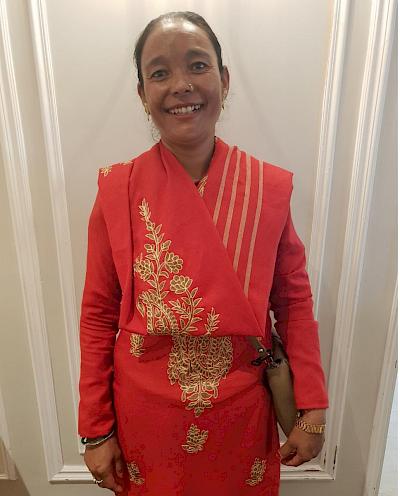
Can you tell me a bit about yourself?
I was born in Jumla District in Patarasi and have lived there most of my life.
I was married young and had two daughters, a son and then another daughter. It was hard for myself and my husband to earn a living, so we migrated to India with the oldest two children, where we worked in construction. My husband was suffering from an ulcer and passed away seven years ago.
I then returned home.
With the help of an NGO, I learned how to become a seamstress. It’s not easy to buy clothes and I often didn’t have the money to do so. Actually, I made this outfit I’m wearing today.
How did you become involved in the wild plant harvesting trade?
I was lucky to be able to start a small shop where I live, selling cigarettes and other items. One day a man asked about some of the plant species locally and if I could supply them. I decided to try and source some of this material and experiment with selling it.
This was three years ago, and I now earn more from this than from my shop. I started out harvesting Banlasun, Setakchini, Satuwa Paris polyphylla, and Yarshagumba Ophiocordyceps sinensis in small quantities. Now I buy from harvesters locally, mainly from women in local villages, and sell onto middlemen or businessmen with permits.
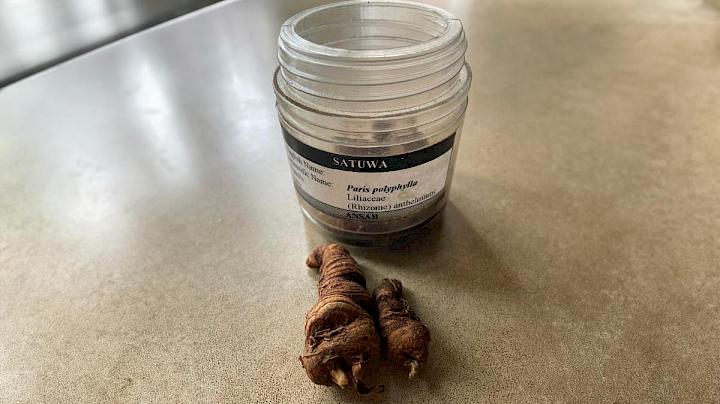
Do you know what happens to the plant and fungi material you sell?
I know that a lot of what I sell goes to India or China, but I’m not sure of what products are made.
Can you tell me why harvesting is important in your community?
Everyone is involved in harvesting, not just women, especially as the value of yasagumba has increased a lot. You can get 500 Nepalese Rupees [equal to around £3] for a small one about the size of half your little finger.
Children of 14-15 years old will often accompany their parents. It’s interesting and down to luck. Some people harvest lots, maybe a hundred in a day and others find nothing. People might exchange rice or take out loans in exchange for what they harvest.
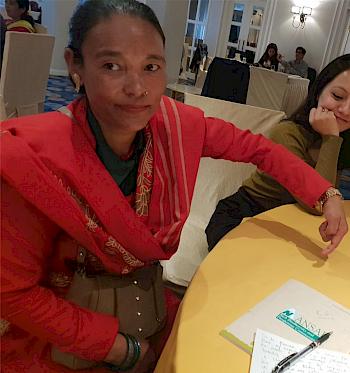
How would you start out as a harvester of yasagumba?
Some people will get a loan from a middleman in order to buy the special clothes that we need in order to harvest. You need raincoats and tough shoes to get yasagumba. However, if you don’t find the yasagumba you can end up in big debt. Then you cry because you cannot pay back the middleman.
What hopes do you have for the future of your business and for your family?
I hope to grow my business, but we’ll see what happens next.
I’d like to earn extra money and look after all my children. I’m not educated. I can’t do mathematics or read and write well. I can understand things from communicating verbally and so it’s been great to share and exchange. Speaking in person is so important.
As I didn’t have the chance to study, it’s been really important for me to send my children to school. They now teach me mathematics and writing. I don’t feel ashamed or awkward about this anymore though, we are all different and can contribute in different ways.
I’d like my children to have proper jobs with monthly salaries in the future. It was hard for me to do this as I wasn’t educated at all. My children have all gone to high school. My youngest would like to study further and keeps asking me to sell some of my land in order to fund this and says she will then get a job and look after me. I will do this if I need to.
How did you learn about this workshop?
I heard about this workshop from another trader in the Jumla district. We know that the plants travel far but I didn’t know how big the trade was until today. I can see there are a lot of big businessmen here that I’m keen to build relationships with.
What do you think of the workshop?
This workshop is a new training experience for me. I’m so happy and glad I had the opportunity to come, learn from others, and share my experience.
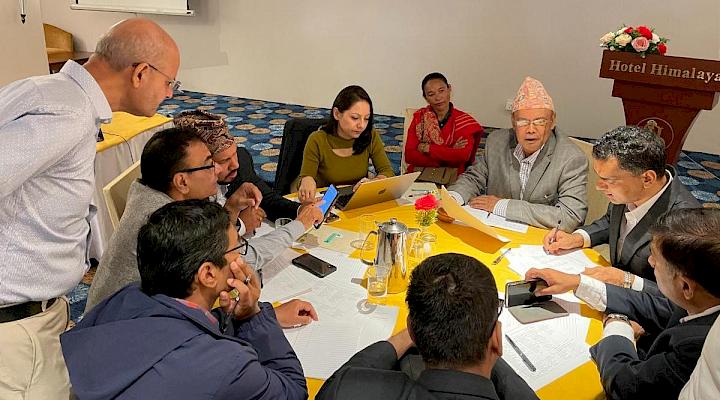
Why do you think sustainability is important for wild plant harvesting?
We understand how to harvest well. For the yasagumba, we don’t dig deep. We only go a half the little finger’s length into the soil. This doesn’t disturb it too much. You look across the landscape lying down low and you can see with your eye the caterpillar if you are lucky. You need to have patience in order to harvest the yasagumba.
Once a group of men went for harvesting. One was sitting the whole day with a paper. He left when his friends arrived and they quickly saw the caterpillar. What bad luck for him.
Are there any particular challenges you face as a woman in this business?
For women there are some challenges, I think. I have seen middlemen negotiate with others and I don’t know if they are always fair with me. Sometimes I wonder if the price drop they say has happened has really occurred. I’d like to be able to know what price I should expect. I have an accountant that helps with my own price tracking, but it would be better if I could do this myself.
The ANSAB workshop culminated in the establishment of the Jadibuti Agreement, drawing upon the insights contributed by its participants. By tapping into the collective experiences of all stakeholders involved, a consensus was agreed on Five New Pathways designed to secure a sustainable future for Nepal’s commercial plant sector.
For Ramila, this workshop not only fostered invaluable connections within her industry but also promised enhanced support to industries like hers through the newly formed agreement. These pathways aim to nurture a more transparent and fair supply chain, ensuring the survival and prosperity of both Nepal’s plants and its people.
About Asia Network for Sustainable Agriculture and Bioresources (ANSAB)
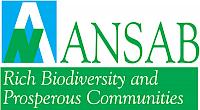
Established in 1992, ANSAB has a vision of rural South Asia built on rich biodiversity and prosperous communities. This vision includes rich, healthy and productive ecosystems actively managed and sustainably used by formerly poor local communities. It also features adaptive people and resilient ecosystems able to cope with global climate change. Generate and implement community-based, enterprise-oriented solutions that conserve biodiversity and improve the livelihoods of the poorest of the poor while bolstering national economic development and addressing climate change is the mission of ANSAB.
ANSAB has implemented conservation and development programmes in more than 30 districts of Nepal and provided policy inputs and services to the government and development partners in seven Asian countries. ANSAB has introduced FSC certification in Nepal, supported enterprises in achieving organic and wildlife-friendly certification, supported NTFPs collector groups and producer enterprises for their management practices complying with FairWild standards, and led successful on-the ground implementation of the UKAID funded Darwin Initiative project 25-018. After the successful implementation of the project 25-018, UKAID funded Darwin Initiative program further provided the project 28-026 for the upscaling of the successes.
About FairWild

The increasing demand for wild plants—as ingredients for food, cosmetics, well-being and medicinal products—poses major ecological and social challenges. The pressure on potentially vulnerable plant species can endanger local ecosystems and the livelihoods of collectors, who often belong to the poorest social groups in the countries of origin.
As a response to these concerns, the FairWild Foundation is working with partners worldwide to improve the conservation, management and sustainable use of wild plants in trade, as well as the livelihoods of rural harvesters involved in wild collection. TRAFFIC has supported the development of the FairWild Standard, and now hosts the organization’s Secretariat under a partnership agreement.
About University of Copenhagen



